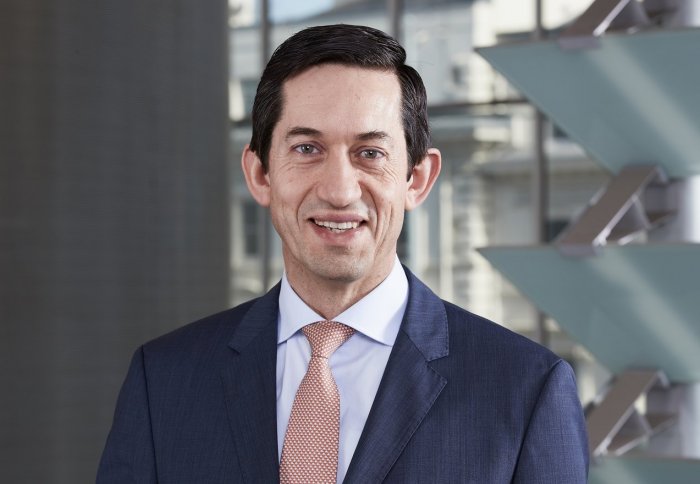'Innovation happens when you mix technology and business' says new Dean

Professor Francisco Veloso talks about his new role as Dean of Imperial College Business School and the importance of innovation across the College.
Before joining Imperial, Professor Veloso was Dean of the Católica Lisbon School of Business and Economics in Portugal.
On his first day he spoke to Laura Singleton about his thoughts on becoming Dean at the Business School and a bit about his interests outside of work.
How do you feel about becoming the Dean of Imperial College Business School?
Being part of an institution such as Imperial is really exciting. I’m particularly thrilled about how the Business School and other faculties within Imperial can collaborate to drive innovation and create new businesses. Innovation happens when you mix technology and business and that’s what you see here at Imperial, which makes it a very dynamic place to research, work and study.
Across the College people are developing fantastic new technologies and solutions to improve society, and the Business School is in an incredible position to support that innovation by helping on the business side of this process.
What makes Imperial stand out from other institutions you’ve worked at previously?
I’ve worked in a diverse range of institutions, but there aren’t many business schools like Imperial that are part of a leading university specialising in science, technology and medicine. This makes it a great environment to study, learn and prepare for the future, particularly if you’re a business student who is seeking to join or lead a venture to commercialise cutting edge technology. As science and technology have such a huge impact on our lives, I think being part of a university such as Imperial makes for a more creative and engaging environment to study for a business degree.
Which areas do you see as having the strongest business potential?
London is an amazing city for many reasons and a real melting pot of different cultures. It’s very dynamic, which makes it a very attractive place to study and do business.
– Professor Francisco Veloso
Dean of Imperial College Business School
I think entrepreneurship is a key area for both the Business School and the College. Entrepreneurs have really transformed the business world and will continue to do so. As a result, young people are now much more aware of the value of starting their own business or social venture. The Business School is at the cutting edge of research in this space and does a lot to support the ambitions of students who want to become entrepreneurs.
Another area that excites me is the digital revolution. Digital technology is really having an impact on how business is done globally, which creates amazing new opportunities, but also raises important concerns for companies who need to adapt to meet the pace at which digitisation is transforming business models.
This digital transformation cuts across core disciplines within business education, from marketing to operations and finance. This presents a significant opportunity for business schools such as Imperial to further collaborate with firms or the public sector to develop cutting edge research and intellectual leadership. This also creates an ideal opportunity for executive training for students to hone the skills of professionals working in this space.
What do you see as the big issues in business education at the moment?
The international business education market is changing rapidly, with new degrees and products being launched to equip graduates with the skills to succeed in business
One of the most significant developments in business education has been the Bologna reform, which established the three year business undergraduate degrees, opening up the business education market in Europe to the pre-experience masters in management.
We’ve also seen a big shift towards online and blended education, which is gaining relevance very quickly around the world. Imperial is well positioned in these new markets and has very strong offerings in the more established MBA space.
What areas of research and teaching in the Business School are you most excited about?
The school has demonstrated strong leadership in all its core disciplines, with finance having particular visibility through the establishment of the Brevan Howard Centre for Financial Analysis. In future, I would like to see us making further progress in the areas that we have been building to address the changing demands of business and society, including healthcare, climate change, innovation and analytics, as well as digital business transformation. A school such as ours can really play a leading role in educating the world about these complex issues.
What do you think about London as a place to work to study?
London is an amazing city for many reasons and a real melting pot of different cultures. It’s very dynamic, which makes it a very attractive place to study and do business. London also has a thriving entrepreneurship scene which makes it an exciting place for people looking to start their own businesses or get into the start-up scene. London is also leading the way in a number of areas such as fintech, mostly through start-ups.
London isn’t perfect however – as a Portuguese native, it might take me a while to get used to the weather!

Professor Veloso enjoys mountain biking in his spare time
Finally tell me about your interests outside of work
My interests have evolved over time, depending on where I’ve lived. I very much enjoy doing sport, so when I lived in Boston, I took up squash and snowboarding to keep myself busy during the long winters. When I moved to Pittsburgh, I discovered mountain biking which I continued when I moved back to Lisbon, where there are lots of great trails just on the edge of the city. In London I don’t expect to do much mountain biking for obvious reasons, but I’ll probably go running in Hyde Park instead. I also love travelling and exploring different cultures and, most importantly, spending time with the family.
Article text (excluding photos or graphics) © Imperial College London.
Photos and graphics subject to third party copyright used with permission or © Imperial College London.
Reporter
Laura Singleton
Communications Division